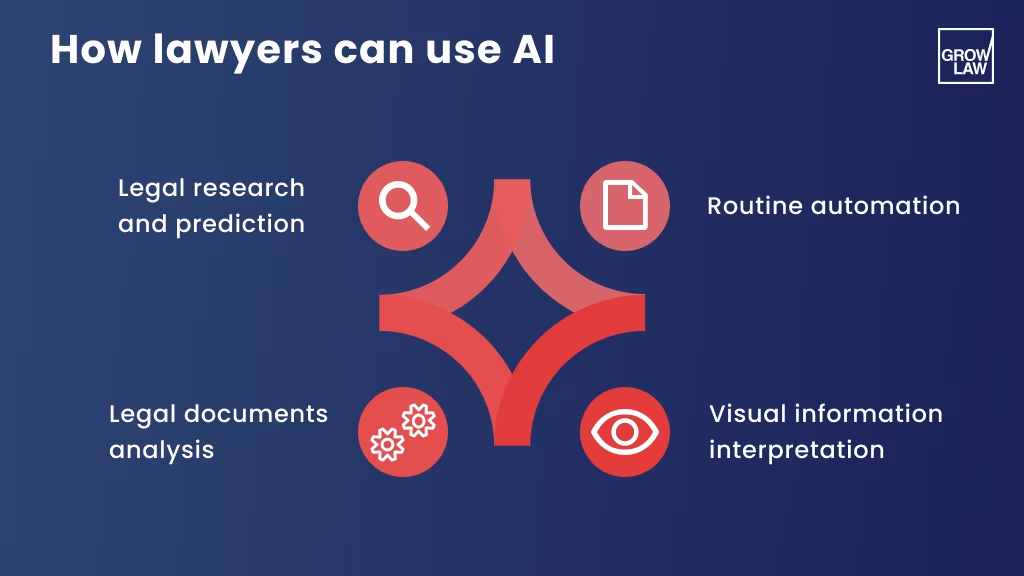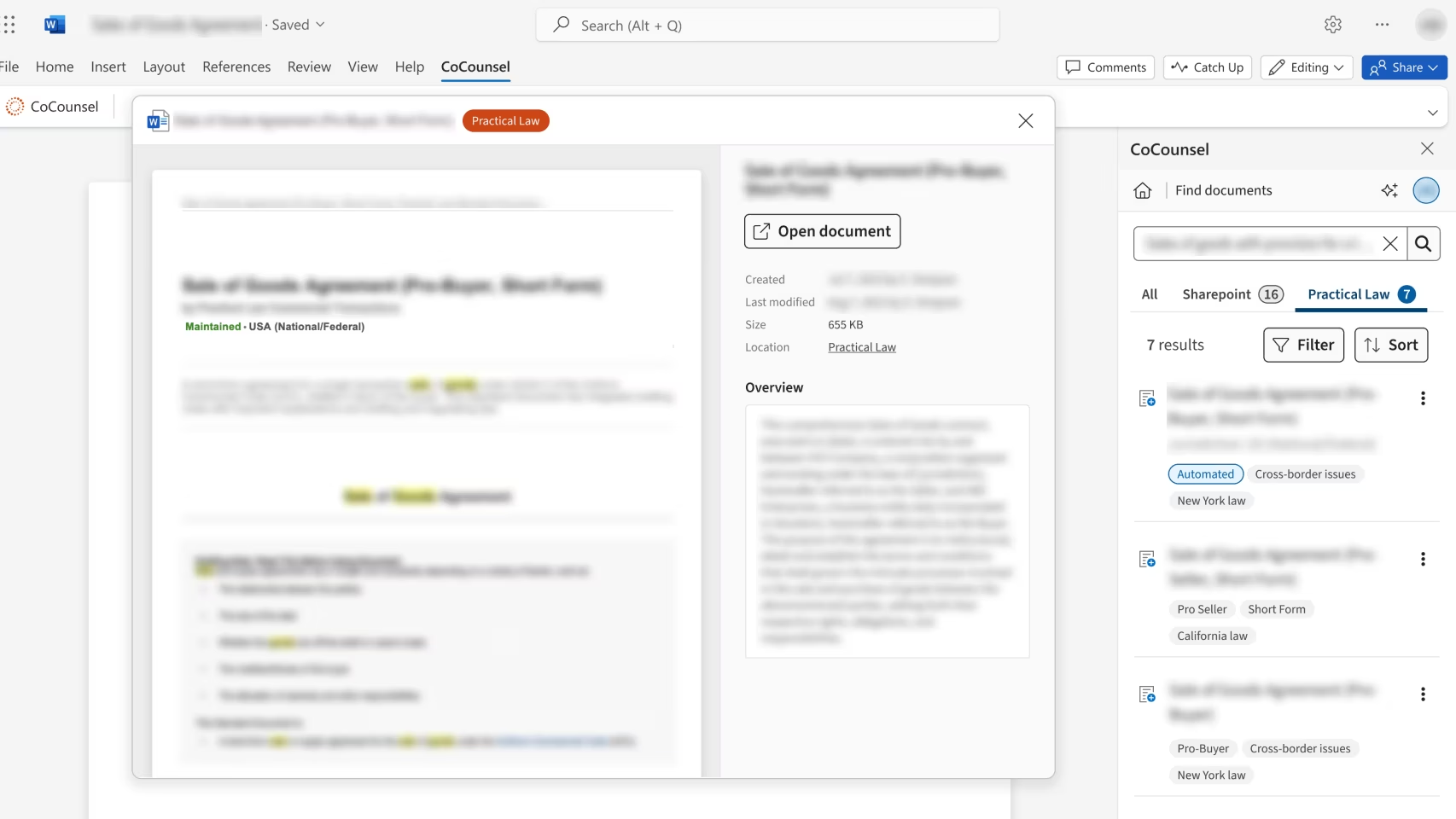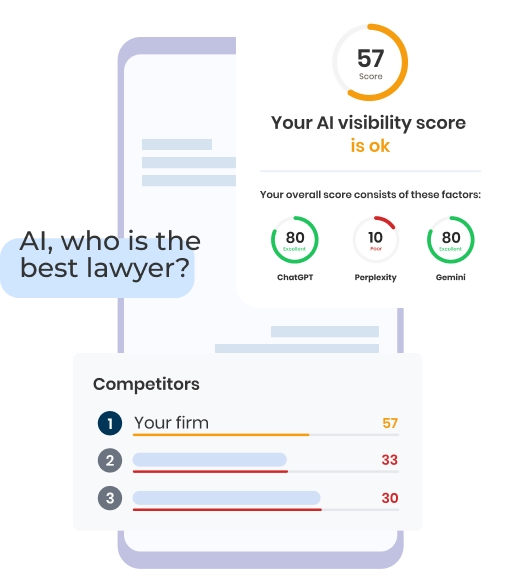Table of Contents
2026 is a tipping point: millions of law firms are racing to integrate AI into their daily workflows and keep pace in an incredibly competitive industry.
The legal AI market, worth $1.9 billion in 2024, skyrocketed to $3.11 billion in 2025 and is projected to hit $10.82 billion by 2030. Those are crazy high numbers!
Adoption isn’t lagging either; 79% of legal professionals now use AI tools to cut costs, sharpen their accuracy, and reclaim hours of billable time.
Today, we're breaking down 12 key tactics to master AI for law firms. Do this and you'll set yourself up for long-term growth!
How is AI Defined Within the Legal Context?
You’ve heard it a thousand times, AI this and AI that. But what does Artificial Intelligence actually mean for your law firm?
Simply put, AI is just a machine simulating human intelligence. Since John McCarthy coined the term back in 1956, it’s gone from a sci-fi movie plot to an everyday reality.
69 years later, and tools like Alexa answer questions, Netflix recommends your next binge, and cars practically drive themselves.
But how does that translate to the legal industry you operate in? Here’s the short version:
- Machine Learning (ML): Uses past case data to forecast outcomes, spot trends, and guide strategy.
- Natural Language Processing (NLP): Scans thousands of documents in seconds to surface key clauses and rulings.
- Deep Learning: Uses neural networks to process speech, images, and patterns hidden in complex evidence.
- Robotic Process Automation (RPA): Automates repetitive tasks like data entry, review, and redaction.
- Computer Vision: Analyzes video, images, and handwriting for stronger forensic insights.
AI isn't here to necessarily replace your legal expertise, but it does make your work faster and a heck of a lot less stressful.
Can Law Firms Use AI?
Absolutely — and many already are! AI in law has grown rapidly, jumping from just 19% in 2019 to 79% in 2025.
You may have seen it yourself: AI goes beyond research and document review.
In 2026, AI for lawyers points out which practice areas aren’t pulling their weight, suggests smarter flat-fee pricing, and even tracks KPIs to show exactly where money is being wasted.
Then there's the time benefit! Thomson Reuters reports lawyers have saved as much as 30% of time on admin tasks, thanks to AI.
For lawyers, that means more time on strategy, advocacy, and client service where their human expertise truly matters!

AI Use Cases Reshaping Legal Workflows
How can AI benefit attorneys? By taking on the boring stuff like automating routine tasks, reducing errors, and streamlining research.
AI frees you up to focus on higher-value legal work that's truly worth your $200+ billable hour.
1. Streamline Your Legal Research
Research is part of the job, but it doesn’t have to eat up your entire day. AI legal research platforms like CoCounsel make the process faster and more accurate:
- Pull rulings in seconds: Instead of combing through hundreds of pages, you can surface the exact statutes or case law you need almost instantly.
- Ask plain-English questions: Type something like “Which contracts mention arbitration clauses?” and get direct answers without endless keyword trial and error.
- Cut discovery costs: Since discovery can account for most litigation expenses, AI tools slash hours of manual review, saving you and your clients a lot of money.
If AI can save time and sharpen your strategy, hey, we're sold!
2. Automate Document Management
When was the last time you had to manage a document? Probably an hour ago. And it took way longer than it should have. Legal AI tools come in clutch.
Upload the client’s files and let legal AI tools like Logikcull or RelativityOne do the sorting, like matching documents to requests.
With sensitive details like Social Security numbers or account info, AI redacts them automatically and produces a ready-to-file log.
Instead of blowing hours on admin work, you can (finally!) stay focused on legal strategy and client conversations.
3. Draft and Edit Legal Documents Faster
Think about how much time you spend on legal document creation, agreements, or briefs.
Now imagine starting with a polished first draft instead of a blank page! AI for lawyer tools like CoCounsel or Paxton can pull the right clauses, suggest language, and get you 80% of the way there in minutes.

They don’t stop at drafting either. AI checks for missing terms, inconsistent language, or risky provisions.
You'll get cleaner documents quicker, and more time to focus on what clients actually pay you for.
4. Improve Your Risk Assessment
As a lawyer, you know that missing a risky clause or precedent could sink a case or damage your reputation.
Make sure that never happens with AI-powered tools.
Platforms like Blue J Legal can scan contracts and agreements to flag loopholes, vague terms, or hidden risks before they come back to haunt you.
Others like Lex Machina use past rulings to predict how your case might play out, giving you an edge in deciding whether to settle or fight.
Instead of waiting for problems to erupt, you’ll spot them early, protecting your clients and safeguarding your practice.
5. Due Diligence and eDiscovery
Pop the champagne. You don't have to be buried under mountains of documents anymore!
AI for lawyers does the due diligence and discovery by handling the review, sorting, and flagging for you.
Document Management
- AI scans and categorizes thousands of files in minutes.
- It flags errors, inconsistencies, and anomalies so you don’t miss critical details.
- Organized documents mean smoother workflows and easier collaboration.
eDiscovery
- Tools like RelativityOne and Everlaw use predictive coding to rank relevance and identify privileged content.
- Instead of slogging through terabytes of data, you get the important evidence first.
- AI reduces research and review time by up to 72% — a huge cost and time saver.
AI software can shave days off discovery, and even that is just scratching the surface!
6. Optimize Contract Analysis and Compliance
As you know, contracts are detail-heavy, and overlooking one clause can derail a deal.
AI for lawyers pulls out the essentials — terms, obligations, and risks — so you see the big picture without getting lost in fine print.
Instead of reviewing every page manually, platforms like Kira Systems can compare new agreements to templates or past contracts, flagging inconsistencies before they slip through.
Some AI solutions even dig deeper, running due diligence on counterparties, checking financial stability, past litigation, and regulatory red flags.
7. Improve Communication and Client Relations with AI Chatbots

Your clients want answers... and they want them now.
AI-powered chatbots and virtual assistants like LawDroid or DoNotPay give them 24/7 access to case updates, FAQs, and scheduling without waiting for a callback.
Get this: With natural language processing, these tools can hold human-like conversations, understand context, and provide clear, accurate responses. Pretty neat, right?
On your side, chatbots also collect data from interactions, helping you spot trends and improve your services.
8. Automate Your Billing with AI
Billing doesn’t just eat time — it chews up your money too... i.e., mistakes in law are often costly!
AI-powered billing tools like TimeSolv and CARET Legal automatically track hours, categorize tasks, and generate invoices with far fewer errors.
Instead of chasing down missing entries or double-checking line items, you get accurate, ready-to-send bills.
Some platforms even sync with case management software to log time in real time.
You'll generate faster invoices with fewer disputes; hey, we like the sound of that!
9. Predict Case Outcomes with AI Analytics
What if you could forecast a case before stepping into court?
With AI-powered analytics, that’s no longer wishful thinking. Tools like Relativity and Lex Machina look at historical case data, judge rulings, and litigation patterns to predict likely outcomes.
Beyond case prediction, these platforms help you track KPIs like win rates, settlement values, or client costs!
You can make smarter calls on whether to settle, negotiate, or push forward — armed with data across your legal departments.
10. Improve Your Legal Content with AI
Have you ever rushed a brief at midnight and worried about a typo, or worse, a bad citation?
That’s why AI for lawyers is your biggest save. You don't have to dig through endless case law and articles anymore.
Tools like Clearbrief can pull the most relevant sources and even check that your citations are rock solid.
On top of that, AI acts like an extra set of eyes in the legal profession — catching grammar slips, smoothing clunky sentences, and keeping your writing sharp.
Platforms such as Grammarly Business or WordRake adapt to your style, so your briefs, client memos, and even blog posts sound polished without hours of editing.
11. Make Your Lawyers' Lives Less Stressful
Artificial Intelligence (AI) can potentially improve well-being and reduce stress among lawyers by alleviating the burden of mundane and repetitive tasks. This automation frees up valuable time for attorneys to focus on more intellectually challenging and strategic work, reducing stress and burnout.
Furthermore, AI-powered virtual assistants can handle routine client inquiries, manage schedules, and generate standard legal documents. These virtual assistants, accessible through voice commands or chat interfaces, minimize administrative distractions and enable lawyers to concentrate on critical matters.
12. Improve Legal Services for Your Clients
At the end of the day, clients care about results. Here's just a glimpse of what AI gives you:
- Expand access to justice: Chatbots and virtual assistants make it possible to offer guidance and resources to people who might not be able to afford traditional legal services, bridging the gap for underserved communities.
- Personalized experiences: By analyzing client data, AI can tailor advice, documents, and strategies to each client’s needs, boosting satisfaction and loyalty.
- Faster turnaround: AI conducts legal research, review, and contract analysis, so you spend less time on routine tasks and more on high-value legal work.
AI capabilities are evolving at the speed of light. Your clients can now get quicker, more personalized, and more affordable services — while you streamline your law firm operations.
Leveraging AI to Optimize Legal Services with Douglas Lusk, the Founder of NSLT
In this Grow Law podcast episode, Douglas Lusk explains how small firms can level up with AI and legal tech training. With bite-sized lessons from the National Society for Legal Technology, attorneys can sharpen skills and boost efficiency fast.
How to Integrate AI into Your Workflow
Now you may be wondering, isn't it complicated to introduce AI to your law firm?
Not necessarily! You don't have to learn to code or set up anything too fancy. It’s about making small, practical changes that save you time. Here’s a simple way to start:
- Check out what’s already out there. There are dozens of tools built for lawyers — research platforms, billing software, contract review assistants.
- Look at your own workflow. Where do you spend hours every week: drafting contracts, reviewing discovery, chasing invoices? Write down the steps and spot the ones AI could handle faster or more accurately.
- Test-drive before you buy. Most tools offer a demo or trial. Upload a few files, try generating a report, and see how it compares to your usual process.
One firm integrated Kira Systems for its contract review and boosted productivity by 40% in just a few months
Imagine getting back that kind of time every week!
AI won’t replace your judgment, but it can take the work off your plate so you can focus on strategy, clients, and (yes!) even taking the weekends off.
Use AI Ethically, Legally, and Competently in Your Law Firm
AI feels like the shiny new toy everyone’s racing to grab. But use it wrong, and it can blow up in your face.
So, how do you use AI for lawyers the right way? Let’s break it down.
— Watch Out for Bias
AI only learns from the data it’s fed, and legal data isn’t exactly bias-free. If you don’t test and retrain your systems, you risk baking those same biases into your work. Do you really want an algorithm calling the shots on a case outcome based on skewed history?
— Don’t Hide Behind the Machine
AI doesn’t stand in front of the judge — you do. That means if a tool spits out something wrong, you’re still on the hook. The fix is to build in human checkpoints. Make sure someone (AKA you) reviews and owns the final call. AI’s the assistant, not the boss.
— ABA Rules Aren’t Optional
The ABA already put its cards on the table:
- Rule 1.1: You’ve got to stay competent (and that now means tech-competent).
- Rule 1.6: Protect client confidentiality because your career depends on it.
ABA Formal Opinion 483 is basically a giant reminder to vet your vendors and know where your data’s going before you plug anything in.
— Guard That Client Data
AI thrives on data, but your clients expect Fort Knox. Encryption, access controls, vendor vetting — no shortcuts here. And if you’re handling data tied to EU citizens, GDPR rules kick in whether you like it or not. That means consent, limits, and fast reporting if things go sideways.
— Train Everyone (Yes, Even Partners)
Nobody’s born knowing how to wrangle AI tools. Training is key. Tools like the National Society for Legal Technology make it easy with quick-hit lessons you can knock out in five minutes. When’s the last time a partner had hours to “learn tech”? Exactly.
— The Real Talk
AI can make your firm smarter, faster, and way more competitive. But if you skip the ethical side, you’re asking for trouble. The gap between firms that get this right and those that don't is worlds apart.
Future AI for Attorneys: Trends for 2026 and Beyond
The AI wave in law is only rising higher... and higher... and higher!
82% of firms are now investing in AI, and Gartner predicts that by 2026, 75% of legal departments will boost spending on legal tech.
Three trends are already reshaping the future:
- Agentic AI: Systems that can autonomously handle multi-step workflows like eDiscovery or contract review under your supervision.
- Sovereign and Regional AI: Tools built to comply with local data laws, ensuring sensitive information stays within borders.
- Democratization of Analytics: AI “copilots” that let any lawyer, even non-technical ones, query complex data in plain English.
Law firms that embrace these AI shifts today will leap ahead of their competitors and lock them out of the arena tomorrow.
The gap between tech-forward and tech-resistant practices is about to get a lot wider.
Will AI Replace Lawyers?
We can't say this enough: AI may change how lawyers work, but it won’t replace them.
Yes, AI is great at automating routine tasks like research, drafting, and even predicting outcomes, but it can’t match the skills that make you indispensable.
Clients don’t just want data; they want wisdom, empathy, and advice tailored to their unique situations. As a lawyer, you offer up the legal, business, and human expertise to win cases like no algorithm can.
AI struggles with that nuance. That’s why your role as advocate, negotiator, and counselor remains at the heart of your legal practice.
Stay on Top of These Rapid AI Shifts!
Whew, we just covered a lot! AI touches almost every corner of a modern law firm, from legal research to billing, and legal risk assessment to client care.
If your head’s spinning, that’s normal. The point isn’t to master everything overnight — it’s to start. So, don’t just read about AI... pick one tool this week and start building your firm’s strategy.
If you want an edge, partner with Grow Law. We’ve helped 100+ firms achieve a 400%+ marketing ROI.
Powered by AI, our law firm SEO, PPC, and web design services can build you a reliable, consistent pipeline month after month.
















